- Home
- David Levithan
Likely Story! Page 2
Likely Story! Read online
Page 2
It sounded like a place where gay spies retired. Or a twisted Disneyland ride.
Deception Valley.
Like a bad salad dressing.
Deception Hills.
Fake boobs.
Deception Ranch.
Another bad salad dressing.
I looked at my bulletin board and saw photos of me and Amelia; photos of me and my sort-of-maybe-part-time boyfriend, Keith; tickets from old concerts; a backstage pass to my old friend Aaron’s concert at the Hollywood Bowl.
Backstage pass. Pass.
Deception Pass.
Bingo.
Now all I needed were about a dozen characters, two dozen plotlines, and a map of the town.
This time I looked up at my shelves. Specifically, I looked at the row of eleven notebooks on the very top shelf, my entire journaled life since the age of twelve.
Surely, there was enough reality there to be turned into a soap opera.
I put my laptop atop my lap and started flipping through all the years of passionate handwriting. It only took a few memory flashes to get me started.
This wasn’t going to be based on a true story, with the true story being my life. Yeah, I started with autobiography, but I quickly diverged from that. I wanted this to be about real people with real problems. (Life with my mother did not count as real.) I started with the basic shape of all storytelling—the romantic triangle. This was something I knew about. So I plotted: Ryan is in love with Sarah, who is best friends with Jacqueline, who is in love with Ryan. Sarah does the honorable, self-defeating thing and lets Ryan go with Jacqueline, even though Sarah secretly wishes it was her. The complications start to add up. The whole town gets involved.
Unlike soaps where one catastrophe follows another and every character is a different shade of psycho, this would be about normal people and all of the messes they get into. It would be a likely story. That would be the big thing about it. And it could even be the title, just so people knew where we stood. Likely Story.
I typed through the night.
And that’s how my second life in soap operas began.
“You did what?” Amelia said after I told her the whole story.
“I e-mailed it to Donald before I came to school. We’ll see.”
We were heading into Mrs. Finch’s Universal Themes class. That was the thing about Cloverdale—it didn’t believe in simple classes like “English” or “Math.” No, my schedule was full of Universal Themes, Logic and Equations, Heroic Tales, and other Incredibly Vague Nouns With Occasional Adjectives. The students, for the most part, liked to show up to class stoned, so I’m sure it all seemed very deep to them. To me, it was like drowning in mental mayonnaise.
“I’d love to talk about gestalt today,” Mrs. Finch announced after the class bell rang. “Who’d like to start talking about gestalt?”
Amanda Hooper saved the day, as she always did, by knowing exactly what Mrs. Finch was talking about. She went on about Freud and Nietzsche and the “gestalt paradigm.” Some of the stoners nodded, but the rest of us couldn’t have been more lost if we were on a desert island.
“What about you, Mallory?” Mrs. Finch asked. “Where do you locate gestalt in these texts?”
Over the years, I’d seen my mother do hundreds of interviews, and after a while, I realized that she’d discovered the secret to the successful answering of questions: No matter what question is being asked, you can use it to answer a completely different question. For example, if she was asked, “Has motherhood been hard for you to balance?” she could answer, “Not as hard as taping my shocking love scene with Dashell Blakemore, which will air next Thursday—everyone should watch!” (This is, I’ve since learned, called “media training”—you think it means that you’re trained to work with the media, but, really, you’re the one training the media to be a slave to your whims.)
I decided to use my secondhand media training now with Mrs. Finch.
“I think Invisible Man shows us that you don’t have to be invisible to be invisible,” I said. “It’s enough just to be poor.”
“A good point!” Mrs. Finch cheered. “And what else?”
“It would seem, Mrs. Finch, that invisibility is a Universal Theme. I’m sure it can even be found in Harry Potter.”
“The invisibility cloak!” one of our stoner kings, Leaf (not his real name), called out.
“I see,” Mrs. Finch said. And she was about to say something else, too—but then my cell phone rang and interrupted everything.
I didn’t usually have my cell phone on in class—Mrs. Finch was a big confiscation fan, and my phone meant too much to me to risk losing it. But I was anxious about Donald’s lunch with Stu Eisenhorn, and I was afraid if I set the phone to silent I would miss something important.
I looked at the screen. It was Donald’s number.
“I have to get this,” I said.
Next to me, Amelia let out a string of excited little shrieks.
Everyone was looking at me—especially Mrs. Finch.
“I’ll take it outside,” I said. As if to explain, I added, “It’s an agent.”
Mrs. Finch called after me, but I didn’t care—Departure for Good Reason was, I imagined, a Universal Theme as well. I’d find a passage from Invisible Man or Harry Potter or whatever to back it up.
“Donald,” I said, “talk to me.”
“Hello, Mallory. I hope I’m not interrupting anything.”
I looked at the door to Mrs. Finch’s classroom. “Nope. Nothing.” I found it sweet that Donald could never remember that I was still in school. Most of the children he dealt with had on-set tutors.
“Good! I have news for you.”
“Good news?”
“Great news!”
At this point I was nearly shrieking, too. And I am not a shrieker.
“Whatwhatwhat?”
“I pitched,” Donald told me. “He swung. It connected.”
“In non-baseball terms?”
“Stu Eisenhorn really loves Likely Story. If there’d been a green light in the restaurant, I believe he would’ve green-lit it on the spot. He thinks it’s a great story, and, just as important, he thinks you’re a great story. ‘She’s the next generation of soaps,’ he kept saying. It was my phrase, but I’m letting him think he came up with it himself.”
“So what does this mean?” I asked.
“It means we’re talking with the daytime president tomorrow. I’ve started spreading the word, and the buzz is already cresting. Greta from Page Seven has already called me. Twice. And that old battle-ax hasn’t covered your mother since her recipe for the Page Seven Celebrity Soap-Opera Cookbook was such a disaster.”
“You couldn’t have seriously expected Mom to know the difference between a teaspoon and a tablespoon….”
“I think it was more the fact that she didn’t know eggs could be separated.”
“She thought some eggs had whites and others had yolks. Is that really so hard to believe?”
“I had to work very, very hard to prevent Greta from putting that into her column. But now she’s all over you. And you don’t even have a show yet.”
“But I will?” I asked.
“Yes, you will.” Donald sounded sure of it, and that was good enough for me. Donald had been the one to tell Mom to take the part in Good As Gold instead of a two-minute role in an Indiana Jones rip-off movie. Mom had said he was crazy, that she was made for the big screen. But his instincts trumped hers, and, as a result, I was a soap-opera baby instead of the daughter of a straight-to-video starlet.
“What time’s the meeting?” I asked him.
“Ten. Can you do that?”
“Of course I can.” School? What’s school?
“Whatever you do, don’t dress up. Look your age. That’s what we’re selling.”
I figured I could handle that.
We talked a little longer, but I knew I had to get back into the classroom soon. Not because of Mrs. Finch—I couldn’t care less about Mrs. Finc
h. But I was sure that Amelia was going to explode if I didn’t give her the update right away.
All eyes were on me when I walked back in. All I had to do was smile and Amelia was out of her chair, hugging me, jumping us both up and down. That somehow made it more real. This was really happening. I was in shock, but, luckily, Amelia expressed enough excitement for both of us.
“Your show! They’re going to give you a show!” she cried.
“Our show,” I told her. “Our show.” And I meant it. I knew right away that it would be much more fun if we did it together—the writer and the star. I had no desire whatsoever to be in front of the camera. Amelia could do that. We would support each other, be there for each other, experience it all together.
Mrs. Finch tried to regain control of the class, but it was too far gone now. I didn’t want to tell everyone the exact idea for Likely Story yet—I didn’t want to jinx it. So instead we talked about favorite soap-opera “themes,” and everyone had a thing or two to say. Leaf, it appeared, was partial to twins separated at birth. Amanda liked it when nightmares foretold plot twists. Amelia was a sucker for people returning from the dead—I made a mental note of that. Even Mrs. Finch made a contribution, saying that more than resurrection, she liked it when characters were reincarnated from dead relatives or ancient monarchs. I made a mental note of that, too, but toward the back of my mental notepad.
I tried to play it cool for the rest of the school day. Now that Amelia (and our whole Universal Themes class) knew, there were two other people I was dying to tell—Keith and Gina.
Keith was waiting for me by his car, an old Ford Mustang he’d lovingly restored by hand. As usual, my body temperature rose a few degrees when I saw him, and my pulse got that fluster-flutter that comes from liking someone you’re not entirely sure you should like. With some guys, you feel like it’s destined to be. With others, life makes you work for it.
“Hey, sailor,” he called out to me. We had this thing—we always called each other nicknames, but we could never use the same nickname twice. It was like we were auditioning them and having fun until we found the ones that stuck.
“Hey, bugle boy,” I replied. He held his arms open a little, and I walked right into them.
“Mmmmm,” he said, pulling me a little closer before kissing me. I loved the way he mmmmmed. Like every time he saw me I was slipping off a negligee.
“Guess what,” I said.
“What?”
“Apparently, you’re kissing the future of soap operas.”
He kissed me again. “I knew there was a different taste to it today. Yes, a little soaplike. And opera! I definitely taste opera.”
“I’m serious,” I said, although I didn’t feel the need to be. Keith tended to unserious me.
I told him what had happened so far. He didn’t seem to understand most of it, but that was more than okay with me; there were enough people in my life who kneeled before Nielsen ratings. It was nice to have a guy who couldn’t name or recognize the Desperate Housewives cast members. Not even Teri Hatcher.
“I’m so proud of you,” he whispered.
Was this the first time in my life that anyone had said such a thing to me?
Possibly.
Probably.
But that wasn’t all.
“I am so in love with you,” Keith said.
“If only you didn’t have a girlfriend,” I replied, trying not to let the sadness in my voice edge out the happiness of the moment.
“Yeah,” he said, running his hand over my arm. “If only.”
I couldn’t believe I’d brought up Erika at a moment like this. Couldn’t I leave her out of it, just for a nanosecond of us-ness?
No. Clearly I couldn’t. She was always there.
I felt bad for saying it. So I did the natural thing: I made it even worse.
“You don’t have to be with her, you know?” I said. “It could just be us.”
Proud of me now, Keith?
No, I didn’t think so.
“Mallory,” he said, stepping away from me, getting out his keys. “You know it’s complicated.”
Complicated because Erika was going through “hard times.” Complicated because she didn’t go to our school, which made it easier for him to be with me when he wanted to be. Complicated because I was the one making him choose, since she had no idea I existed. Complicated because she came first.
Complicated because I was willing to kiss him anyway.
I knew he wasn’t leaving me (not at that moment) for her. I knew he had to get to work, waiting tables at California Pizza Kitchen in order to afford gas for his Mustang. I knew I had to let him go serve the pizza-needing masses.
But still I wanted to say “stay.”
I always wanted to say “stay.”
“I’ll call you tonight for a pep talk,” he said.
“For what?” I asked.
“For the meeting tomorrow. Duh, kitten!”
We kissed once more, but it was a rushed kiss.
I didn’t watch him drive away, but I had to make an effort not to.
I tried to get back into the groove of my good news. I couldn’t wait to tell Gina.
I drove to the lot where Good As Gold was taped, and Max, the guard, waved me right in with a thumbs-up sign. The lot was a leftover from the studio heyday of the 1940s, when even the places on the lot that never showed up on film were designed to feel larger than life. It was only when you got deep backstage, to the offices and dressing rooms, that things seemed a little less grand and a lot more human.
Gina was where I usually could find her—in my mother’s dressing room, prepping for Mom’s next scene. True to form, she was ironing a kimono when I walked in. Since a kimono would be way too “ethnic” for an out-of-house scene, I figured my mother was going to be taping in one of the three bedroom sets sometime soon. The clothes were really the wardrobe person’s responsibility, but Gina was the only person on the set that my mother trusted.
I was about to blurt out my news to Gina, but she beat me to it.
“Mallory! I always knew you could do it!” she cried, putting the iron down to give me a big hug. I figured that whether or not the show went through, getting this much affection was definitely worth it.
“It’s not a done deal yet,” I cautioned.
Gina shook her head. “Don’t think that way, sweetie. It’s a fantastic idea, and the tidal wave’s on your side. The network needs this more than you could know. And who better to do it?”
Her beaming was like chocolate to me.
“There’s just one thing …,” she went on. But before she could tell me what that one thing was, it barged right through the door.
“How dare you!” it yelled.
“Hi, Mom,” I said.
Gina didn’t know what to do. Then my mother released a guttural “OUT!” and there wasn’t really a question of which direction Gina would soon be heading. She looked to me, and I’m sure she would have stayed and faced my mother’s wrath if I’d needed her to. But I told her it was okay, and she left me alone with Soapzilla.
“I guess you’ve heard the news,” I said, trying to stay calm.
“The news? Is that what it is? You go around my back to my agent—”
“He was the one who called me—”
“You go around my back to my agent and manipulate your way onto my network—”
“Now wait a second. It’s hardly your—”
“And you don’t even tell me. I have the president of the network call me to tell me about my daughter’s idea, and I just have to play along and pretend that I have some idea of what he’s talking about. I sit there and have him tell me that you are going to be the one to rescue daytime drama from the brink. Of. Extinction.”
“This isn’t about you, Mom,” I told her. Forgetting, of course, that there was no way she could define a single situation without being at the center of it.
“Not about me?!? You can’t be serious! This is entirely about
me.”
That was it. I’d had it.
“Stop it,” I told her. “Just stop it!”
“You ungrateful little bitch!” my mother screamed.
“Ungrateful?” I screamed right back. “When have you ever given me anything to be grateful for? If there’s a bitch in this family, I’m afraid it’s you who gets the prize.”
Sixteen years.
I’d wanted to say that for sixteen years.
And now I was saying it, consequences be damned….
“Rest assured, I am not going to let this happen,” she said.
“I don’t think it’s up to you,” I replied.
“I am your mother!”
“Unfortunate, isn’t it?”
Once again, she looked like she was ready to give me a soap-opera slap—it wouldn’t have actually hit me, but it would have looked very dramatic. Either that or she was going to rip all my hair out, one chunk at a time.
I was saved by the bell.
The ring of her cell phone, to be exact.
She looked at the number, then quickly picked up.
Suddenly it was like she was a different person. A normal, calm, kind, funny person.
“Greta!” she chirped. “How wonderful to hear from you! … Yes, it’s been far too long! … I absolutely couldn’t be more thrilled about it, dear. Mallory’s always been my shining light…. Inspiration? Oh, Greta, I just hope like every mother that I’ve been able to teach her all the things she’ll need to be a huge success!”
She was looking at her makeup table when she said all this. Then she looked up into the mirror and saw me perched in the background. With a swipe of her hand, she told me to get lost. This didn’t even count as a truce—just a pause.
I said good-bye to Gina, who had been waiting outside the door. The great thing about her was that she never apologized for my mother; she knew it was my mother’s job to do that. Instead, she gave me a look and another hug that made me know she understood what I was going through … and she also understood I would be getting through it fine. I was lucky: Even if my own mother was a horror show, at least I had Gina waiting in the wings. When I was little, I would dream that she’d adopt me. Sometimes I would even sneak into the backseat of her car and hide there as she drove back to her home and her family. She never seemed too surprised when I popped up at the end of the ride; she’d call my mother, invite me to dinner, then drive me back home at the end of the night. I always begged to sleep over, preferably for good.

 The Lover's Dictionary
The Lover's Dictionary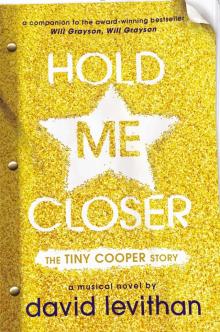 Hold Me Closer: The Tiny Cooper Story
Hold Me Closer: The Tiny Cooper Story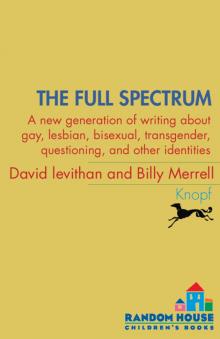 The Full Spectrum
The Full Spectrum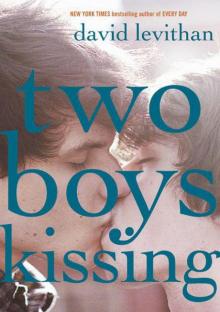 Two Boys Kissing
Two Boys Kissing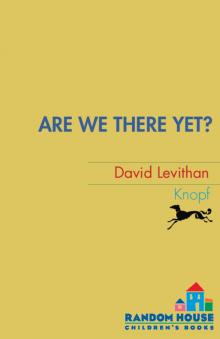 Are We There Yet?
Are We There Yet?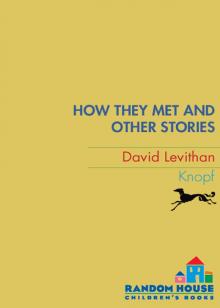 How They Met and Other Stories
How They Met and Other Stories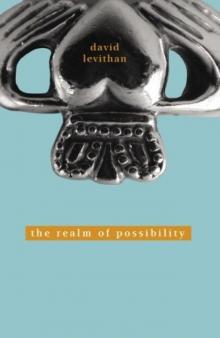 The Realm of Possibility
The Realm of Possibility Love Is the Higher Law
Love Is the Higher Law 19 Love Songs
19 Love Songs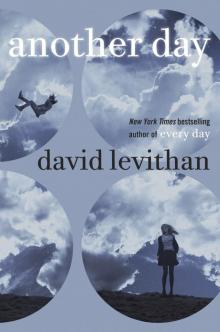 Another Day
Another Day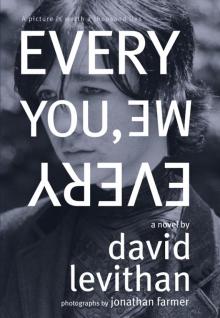 Every You, Every Me
Every You, Every Me Boy Meets Boy
Boy Meets Boy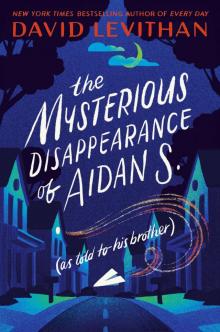 The Mysterious Disappearance of Aidan S. (as told to his brother)
The Mysterious Disappearance of Aidan S. (as told to his brother)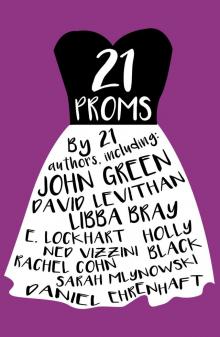 21 Proms
21 Proms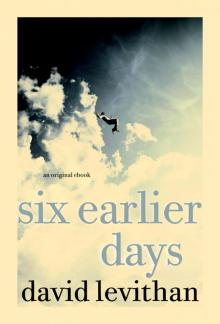 Six Earlier Days
Six Earlier Days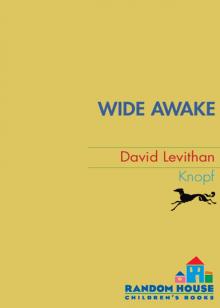 Wide Awake
Wide Awake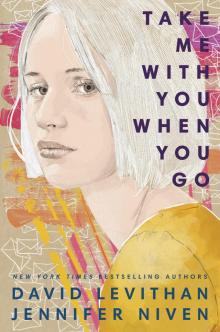 Take Me With You When You Go
Take Me With You When You Go Someday
Someday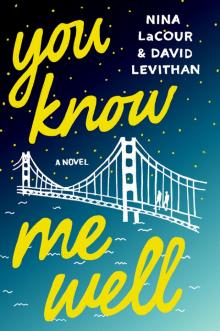 You Know Me Well
You Know Me Well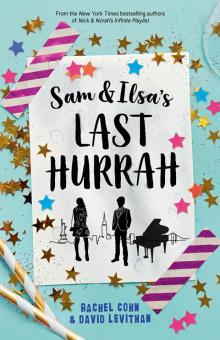 Sam and Ilsa's Last Hurrah
Sam and Ilsa's Last Hurrah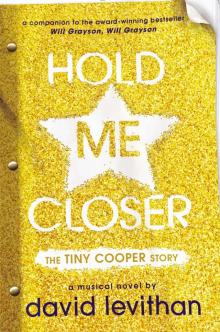 Hold Me Closer
Hold Me Closer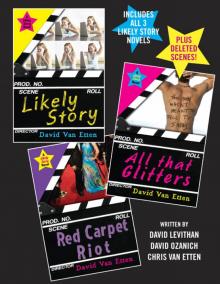 Likely Story!
Likely Story!